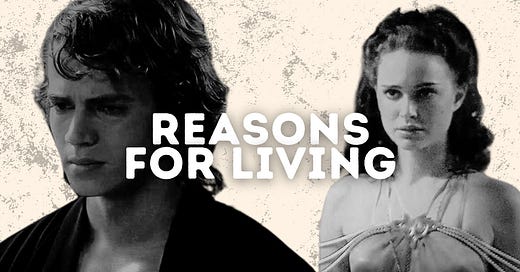We human beings are highly skilled at making ourselves miserable. From our wants and vices to the creepy movies we watch that later give us nightmares — our realities are shaped by the things we seek out and the behaviors we engage in.
Today I want to remind you not to dwell on imagined futures, and to not suffer needlessly in advance of future troubles. To do this, we’ll look at a quick lesson from Star Wars: Episode III: Revenge of the Sith, and the writings of Roman Stoic, Lucius Seneca in his collection known as Moral Letters.
Anakin needed a different perspective
I don’t envy Anakin Skywalker for his tendency to have nightmares that predict possible futures. He is the Chosen One, and Anakin’s connection to the Force is unlike most Jedi of the age. When he awakes in Star Wars: Episode III from a nightmare, he had dreamed that his wife, Padme, would soon die in childbirth. In the dream, Padme is screaming and begging for Anakin to help her. Anakin gets up from bed and paces around the house nervously.
He’s experienced this before, shortly before the tragic death of his mother in Episode II: Attack of the Clones.
Anakin’s dreams are born out of a deep fear of loss. When he longs for or covets a thing (or person), his anxiety swells. Most of us know from lived experience….that what’s heavy on our minds when we go to bed is then part of our dreams later that night. For better or for worse.
Anakin then launches into a campaign to stop his dreams from coming true, no matter the cost. It leads him to incredible evil, and he becomes the eventual cause of Padme’s death.
I often wonder if Yoda, in all his wisdom, gave Anakin the wrong advice in Episode III when Skywalker confides his him about the bad dreams. Yoda’s response is to warn Anakin against attachment and to learn to accept and celebrate death. Yoda basically confirms to Anakin that Padme may well be about to die. This doesn’t help.
In this moment, Yoda put on his best Buddha impersonation, sharing with Anakin the perspective of, “The root of suffering is attachment.”
Maybe things would have been different if Yoda, who is George Lucas’ embodiment of all the world’s great philosophies, had taken a different approach to guiding Anakin in this moment.
The Stoic philosopher Seneca wrote much about the troublesome nature of worrying about the future during his life in 4 BC—65 AD. In Moral Letters, he writes:
“It is ruinous for the soul to be anxious about the future and miserable in advance of misery, engulfed by anxiety that the things it desires might remain its own until the very end. For such a soul will never be at rest — by longing (or fearing) things to come it will lose the ability to enjoy the present.”
Decades later in Episode V: The Empire Strikes Back, Luke Skywalker has similar visions of loss. He has a premonition that Han Solo and Leia will suffer at the hands of Darth Vader and the Empire. Master Yoda tells Luke that the future is always in motion, and to distrust these visions.
I think Anakin needed this instead, skepticism, rather than the call toward superhuman detachment. But he also needed someone to remind him not to forsake the present, and to enjoy where he is at in the here and now. Sadly, that wasn’t possible since Anakin and Padme were in a secret marriage.
A problem for future me
My wife will often say about decisions she has to make, “That’s a problem for future me.” Sometimes I hate this, because it’s like kicking the can down the road on important matters, but it’s how she constructively copes with anxiety and enjoys the moment she is in.
“There is no reason to live and no limit to our miseries if we let our fears predominate,” continues Seneca in Moral Letters.
This is where we have to balance planning for the future with not robbing ourselves of the beauty of the present.
Imagine if Anakin Skywalker had that bad dream about Padme’s death, and instead of getting up to walk the house and fret about it, Anakin rolled over in bed to put a loving arm around Padme….and then went back to sleep….
I’ve had a ton of bad dreams where my family is harmed or the world ends or something crazy occurs. Sometimes those dreams feel horribly real.
When I wake up, I roll over and place my head next to my wife’s. Then I hold her close.
If you’ve seen Episode III you know Anakin’s dream was inaccurate. Padme did not die in the way Anakin dreamed, screaming and crying out for him. It was misdirection. It was the dark side at work in Anakin, feeding on his fear.
The reason for living
Seneca’s quip about there being no reason to live if we live in fear of tomorrow is helpful to me. I worry about the future of the world, you know like World War III, pandemics, asteroids striking us from outer space.
There’s a big difference between loving life and fearing death. If you love life, you won’t have a lot of time for building a bomb shelter and training for the apocalypse. You’ll be too busy traveling, eating great food, reading & writing, making babies, and taking care of your family with a smile on your face.
If you merely fear death and loss, you’ll be an unbearable mixture of anxiety and paranoia. Useful to no one. You’ll miss out on life itself.
“Keep your concentration here and now, where it belongs,” says Jedi Master Qui Gon Jinn to Obi-Wan Kenobi in Episode I, “But I thought Master Yoda said I was to be mindful of the future?” says Obi-Wan back.
“Not at the expense of the moment,” Qui-Gon reminds Kenobi and hopefully reminds us all.
This week as many of us celebrate Thanksgiving and the spirit of gratitude, don’t forsake the moment. To hold on to the status quo or endlessly fear the future is to covet and cling. We should strive instead to treat everything we have as a gift that has been given to us, both the people we love and the time we have.
Who are we to guard it all so jealously?





